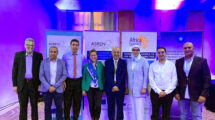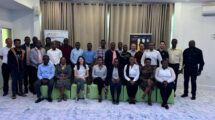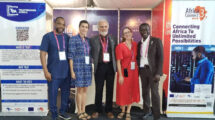African Union calls for development of National Research and Education Networks in all member states.
Words: Nicky Wako, GÉANT
With exponential population growth, Africa is projected to reach 2.4 billion people by 2050 whilst plagued by many challenges, including unequal access to quality education. According to UNICEF, more than 15 million children are out of school in the Horn of Africa alone: a staggering figure with a ripple effect impacting employment, migration, health, and research output.
The African Union (AU) notes that although there is a significant increase in enrolment due to the global prioritisation of, and investment in, education it “masks huge disparities and system dysfunctionalities and inefficiencies” in education subsectors such as technical, vocational, and research, which are severely underdeveloped. These dysfunctionalities and inefficiencies also contribute to Africa’s present statistic of having 350 researchers per million people compared to more than 4,000 for North America and Western Europe[1]– a statistic that clearly leads to Africa having less than 5% of the world’s research output.
The availability of connectivity, and access to it, has significantly progressed over recent years thanks in part to the European Union-funded AfricaConnect3 project, supported by GÉANT and implemented by project partners the Arab States Research and Education Network (ASREN), the UbuntuNet Alliance, and the West and Central African Research and Education Network (WACREN).
These three Regional Research and Education Networks (RRENs) have over a decade of experience in providing a growing number of Higher Education institutions with connectivity and helping to expand the number of end-users. Together with 38 National Research and Education Networks (NRENs) across Africa, they interconnect over 1,900 institutions and over five million end-users, and are instrumental to unlocking the digitalisation of Africa’s research and education (R&E) sectors.
However, tertiary education and research institutions in Africa are still among the least connected in the academic world, a situation that is particularly critical for landlocked countries as their R&E communities are burdened by the excessive cost of connectivity, a problem compounded by the presence of telecom monopolies or market dominance by a single player, and a weak regulatory environment.
The long overdue seat at the policy table
To address the imminent challenges the African continent faces and to achieve the targets of the African Union Agenda 2063, investing in human capital is paramount in order to lift people out of poverty and enable African citizens to contribute to the global quest for solutions through tertiary education and research sectors.
In the past year, the AfricaConnect3 project partners – ASREN, the UbuntuNet Alliance, WACREN, and GÉANT have contributed to the Continental Education Strategy for Africa through meetings and by reviewing documents. The strategy establishes a framework for the digitalisation and acceleration of adoption of digital technologies for Education in Africa, including the development, strengthening, and sustainability of 54 NRENs.
The strategy was finalised on 15 July 2022, with the African Union convening the 4th Ordinary Session of the Specialized Technical Committee (STC) on Education, Science and Technology with the African Ministers responsible for Education. During the meeting, the African Union Digital Education Strategy was adopted and launched alongside the Transform Education Summit in New York on 20 September 2022. The strategy document calls for ASREN, the UbuntuNet Alliance, and WACREN as partners to provide expertise and experience in implementing the NREN objective.
The way forward
The RRENs and NRENs consistently prove that on a continent where so many issues are too often a priority, they are the lifeline for the R&E community. Their agility, innovative solutions, and ability offer an attempt to level the global playing field and they deserve political, social, and economic support.
However, a lack of political recognition and support has long hindered the progress of the NRENs on the African continent and the securing of a sustainable funding pipeline. With the strategy and its adoption by the Heads of State and national agencies, the African RRENs and NRENs now have pan-African political recognition that can be leveraged not only to cultivate inroads to funding, but to engage in high-level policy discussion, and to claim their rightful seat at a policy table where multi-sectoral, multi-stakeholder discussions and decisions take place.
For the RRENs and NRENs, accessibility, affordability, adaptability, and connectivity must be at the centre of the dialogue to ensure that African students do not fall behind and that the African R&E community continues to contribute to the global quest for the betterment of humanity.
[1]UNESCO Institute for Statistics Fact Sheet No. 53, June 2019 FS/2019/SCI/53, data from 2016





